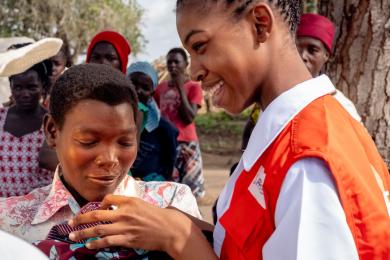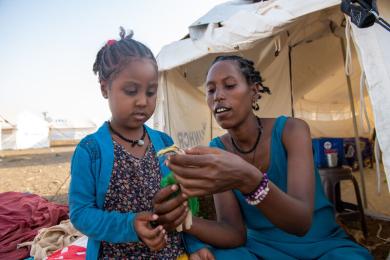In emergency settings, such as armed conflict and climate-related natural disasters, access to sexual and reproductive health services are frequently disrupted or rendered nonexistent. There is also a rise in the rates of unintended pregnancies, unsafe abortions, sexually transmitted infections, pregnancy and obstetric complications, miscarriage, stillbirth, and maternal and newborn mortality. The people least protected — refugees, displaced persons, conflict-affected populations, indigenous peoples, people in low-income settings — are likely to experience compounded difficulties in accessing quality SRH during a crisis. Our Member Associations work in acute, protracted, natural and man-made disasters all around the world, and have done so for decades. In emergencies we reach communities that have little to no access to SRH even in stable times, creating an opportunity for women to access much needed and wanted healthcare.
Providing Lifesaving Care in Emergencies

Sexual And Gender-Based Violence

Sexual and gender-based violence (SGBV), particularly against women and girls, is pervasive and exacerbated in every humanitarian emergency. Yet protection from SGBV is not treated as a priority from the earliest stages of a crisis. Girls and women who experience SGBV need urgent access to confidential and safe sexual and reproductive health services and referral pathways.
Safe Abortion Care In Emergencies

Women in humanitarian emergency settings face increased risk of unintended pregnancies and they are at a greater risk of sexual violence. However, the collapse of health systems means reduced access to both contraceptives and safe abortion and post abortion care (treatment for complications of unsafe abortion). Abortion is now included as an additional priority area in the MISP, a series of crucial actions required to respond to reproductive health needs at the onset of every humanitarian crisis.
Contraception Care In Emergencies

Contraception is lifesaving and a priority health service in emergencies. The 2018 Minimum Initial Services Package (MISP) for sexual and reproductive health (SRH), the global standard for SRH response in acute emergencies, includes prevention of unintended pregnancies as one of six objectives. Contraception should be made available along with other essential SRH services at the outset of every emergency response, and should be scaled up further after the acute stage of an emergency.
Where We Respond
Ukraine Crisis
The world has watched in horror and disbelief at the events unfolding in Ukraine. Hostilities are ongoing and civilians are under heavy bombardment in a number of cities. Nearly 9.8 million people have been forcibly displaced, including more than 3.3 million who have fled the country since the 24th February. In times of humanitarian crisis, when women and girls are most in need, our specialist teams are there. IPPF is working with partners on the ground in Poland, Hungary, Romania, Moldova and Slovakia to link those fleeing the conflict with critical sexual and reproductive health services as well as provide them with essential items such as personal hygiene kits, menstrual hygiene products, blankets, clothes, newborn kits, and diapers.
Read more.

Sudan War
Sudan War
Sudan is experiencing a complex emergency situation after clashes broke out between armed forces on 15 April 2023. More than 150,000 people have moved from Sudan to neighbouring Chad, South Sudan, the Central African Republic, Egypt and Ethiopia. The Sudan Family Planning Association has been responding to the needs of women and girls since the first days of the clashes, providing sexual and reproductive healthcare to internally displaced people in camps, and people en route to other countries for refuge. In addition, our partner in Chad, the Association Tchadienne pour le Bien-Être Familial, has been responding to the needs of refugees.
Read more about the escalating SGBV situation in Sudan here and here.
Read more about the rise of HIV+ cases in Sudan here.

The Climate Crisis
The climate crisis is one of the key challenges of this time. As a major healthcare provider and advocate of sexual and reproductive health and rights, IPPF is committed to supporting communities to adapt to the effects of the climate crisis. The impacts on SRHR can include reduced or unavailable SRHR services in areas affected by disasters, changes in women’s family planning decisions due to uncertain futures, and increased incidence of sexual and gender based violence.
Read more.










